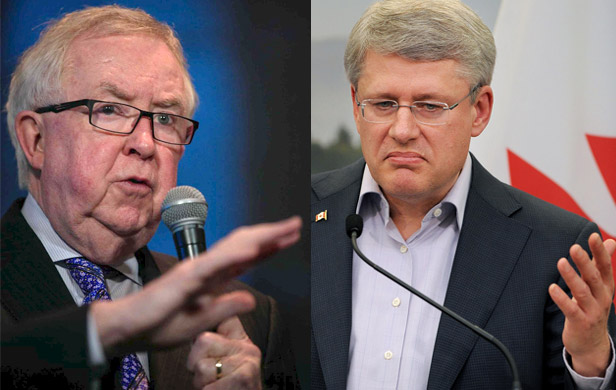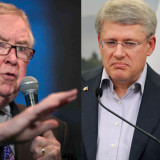
by Alexander Panetta, The Canadian Press
WASHINGTON – Former prime minister Joe Clark says he can’t understand why the Harper government would bar the opposition from a delegation to Ukraine and suggests its combative approach to international issues sometimes hurts the country.
Speaking to a U.S. audience, Clark, who also served as foreign affairs minister, said he regularly involved opposition parties on foreign missions — and Canada benefited as a result.
He cited one example in particular: his co-operation with former NDP MP Dan Heap. Clark said the Mulroney government was on the outs with some key left-wing actors in Central America, and the Toronto New Democrat helped establish valuable connections through his NGO contacts.
“Let me tell you what we did: we involved opposition parties regularly in activities overseas. We relied on them, heavily,” Clark said.
“I do not understand why there is this exclusion of parliamentarians (in Ukraine) — if it happened.”
He made the remark when asked about reports that Canada’s main opposition parties had been refused spots in a delegation to Kyiv this week. The Conservatives called it a government trip, and added that the opposition didn’t even deserve to go after Liberal Leader Justin Trudeau told a joke about Ukraine.
Clark spent an hour taking questions about his new book on foreign policy, “How We Lead.”
The book is deeply critical of what it describes as the Harper Tories’ “megaphone” approach to international affairs — in other words, plenty of loud grandstanding and not much constructive work on the ground.
Clark questions Harper’s attacks on environmentalists
He was equally critical when asked about the Keystone XL pipeline.
He said the government deserves some of the blame if the project is stalled. If the Harper government hadn’t spent a couple of years shouting at the environmental movement, he said, it might not have attracted such opposition.
Clark told the audience that the belligerence began with verbal attacks by Natural Resources Minister Joe Oliver after the Conservatives won a majority in 2011, and continues to this day with environmental groups having their tax status threatened.
All of that, Clark said, got noticed by U.S. environmentalists who carry some influence in the White House. Clark told the forum at the Wilson Center:
[quote]One of the real problems that I think lingers over that pipeline is, before the pipeline question arose, the Government of Canada deliberately went out of his way to be seen as an adversary of environmentalists.[/quote]
“It just seems to me to have been an unwise way to set the stage for the case that we had to make… The steepness of the hill that Canada has to climb was created, in part, by the attitude of the Government of Canada on environmental questions.”
A little praise mixed in with criticism
Clark was complimentary of the government on some fronts.
He credited Foreign Affairs Minister John Baird for his sustained effort on behalf of homosexuals being persecuted around the world.
He also applauded the prime minister for embracing a free-trade agenda that includes the signing of a potentially historic pact with the European Union, and involvement in talks toward a 12-country Trans-Pacific Partnership.
But there was plenty of criticism — just like in the book.
Canada’s ‘adolescent’ tone in foreign affairs
The book calls for a more creative approach to foreign affairs, retooled for a new age, and suggests better outreach with increasingly powerful non-state actors like NGOs.
He laments that the current government, too often, leans toward disengagement.
The book cites as one example Canada closing its Iran embassy. Clark contrasts that with the Mulroney government’s refusal to close its South African embassy in the 1980s, which he says helped it successfully fight apartheid.
“Canada now talks more than we act and our tone is almost adolescent — forceful, certain, enthusiastic, combative, full of sound and fury,” says the book.
[quote]That pattern of emphatic rhetoric at the podium, and steady withdrawal from the field, raises a basic question: What does the Harper government consider the purpose of foreign policy?[/quote]
Time for open debate on big ideas
Clark also bemoans a broader reluctance in Canada to debate big ideas.
He told his audience Thursday that, by the early 1990s, Canadians were tired of activist government following a Mulroney era marked by battles over free trade and the country’s constitutional makeup.
He drew laughs by noting that Jean Chretien promised not to do anything with the constitution — and voters rewarded him with a majority.
“The problem is that, since then, Canada has not talked about much.”
Clark was also asked about a provincial issue — the Parti Quebecois values charter.
He called the plan alarming. He said it’s even more alarming that the PQ might be winning support because of it. A Quebec election is expected this spring, and the PQ has jumped to a strong lead in the latest polls.


Clark laments lack of big issues. They exist, we’re just not pursuing them. We should be settling treaties where there are none and injecting fairness into existing ones. Northern development should be our biggest file, yet we passively let Big Oil take care of its own interests and just sit by and watch the Northwest Passage open up to shipping—Ottawa needs to either take responsibility for its Territorial charges or confederate them so they can get on with it themselves. We’ve been fed the global corporatists’ line about getting government out of the business of being in business for so long now some of us actually believe it, yet public infrastructure is starved and crumbling without government being in the business of directing, encouraging and taxing industry to support much needed infrastructure maintenance and new, northern development. Even with plenty of taxpayers in Canadian municipalities—some eighty-five percent of us—cities are, bricks, mortar and asphalt, down at the heel; they need a new deal. If we don’t fund domestic requirements, how much less will we fund foreign aid? These, and probably others, are all big things we could and should do; but not doing them cannot be construed as conservative prudence. Rather, it’s the neo-right which is pledged to making sure we can never aspire to big ideas again by redirecting wealth that should be fairly taxed to foreign and/or private interests and their bottom lines, not ours. Conservatives they are not—the total lack of national patriotism (no, parades of 1812 reenactments don’t cut it) attests to that. Those big potentials become instead big problems.
So far Prime minister has done nothing but allow corporations cut down protected area’s of forest because of environmental laws that he has removed. This pipe dream will not happen because both american’s and The Canadian people Of British Columbia want to live in a better world. Most rich and the all of the greedy don’t seem to understand ideology of a sustainable world we can live in for millions of years later. If the people and our governments allow these terrible acts of greed and corruption to continue the human race and the rest of the species we who share this planet. Share is to strong a word for humans for the most part we are just killing everything in our path and taking over. The human race is self aware of the direction the world is heading. She is only so big and can only take so much punishment for so long. We need to be thinking differently that is called evolution because right now we are doing the same thing stuck in the same situation as we were over 100 years ago and from what I can see the rich, the greedy, and the people in power don’t want anything to change.
This has been Harper’s modus operandi from the start. Where other administrations and statesmen engage with a handshake, Harper takes the extended goodwill gesture then goes for the knee to the groin. It’s hardly engagement, more like a threat: don’t mess with us, or else.
theres a protest against harper on sat in vancouver….
Ah for the days when the conservatives were respectable people who just had a different point of view, rather than a tyrannical embarrassment.
“He also applauded the prime minister for embracing a free-trade agenda that includes the signing of a potentially historic pact with the European Union, and involvement in talks toward a 12-country Trans-Pacific Partnership.”
I like Joe Clark but he is out to lunch with the above.
Care to explain why? You sound a bit like the Harper-led evangelical right – condemn the opponent because … because … well, just because!
A big reason is the investor-rights provisions, which allow foreign investors to sue Canada over laws and policies they don’t like.
An example is Eli Lilly suing Canada for $500 million for what they see as bad treatment. Also the case of the company suing Quebec over fracking.
TILMA, between BC and Alberta, has the same type of provision. It was brought in with lies about supposed benefits.
CETA would impact local procurement, and add costs to pharmaceuticals. The supposed benefits of CETA are phony made-up numbers.
China-FIPA has the same provisions, as well, as does TPP.
tangler your response to hugh makes it clear you know nothing about the nature of the trade deals that were struck or are being negotiated at this very moment. Trade deals only empower corporations.